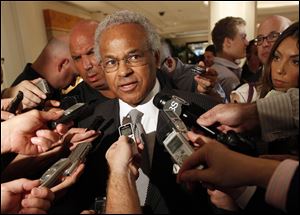
NBA owners opt for lockout as talks fail
Wide gulf between sides could endanger season
6/30/2011
Union chief Billy Hunter speaks to reporters after a meeting with the NBA on Thursday.
NEW YORK — The NBA's labor deal has expired, and the league has locked out its players, the second pro sports league shut down by labor strife.
The collective bargaining agreement, which owners say cost them millions of dollars a year, ended at midnight after players and owners failed to reach a new deal.
Despite a three-hour meeting Thursday and a final proposal from the players, the sides could not close the enormous gap that remained in their positions.
In a call with the labor relations committee, NBA commissioner David Stern recommended that the first lockout since the 1998-99 season be imposed. Teams are prohibited from having any contact with their players.
"We had a great year in terms of the appreciation of our fans for our game. It just wasn't a profitable one for the owners, and it wasn't one that many of the smaller market teams particularly enjoyed or felt included in," Stern said. "The goal here has been to make the league profitable and to have a league where all 30 teams can compete."
The long-expected lockout could put the 2011-12 season in jeopardy and comes as the NFL is trying to end its own work stoppage that began in March.
Despite a final proposal from the players -- which NBA leaders said would have raised average player salaries to $7 million in the sixth year of the deal -- the sides could not close the enormous gulf between their positions.
"The problem is that there's such a gap in terms of the numbers, where they are and where we are, and we just can't find any way to bridge that gap," union chief Billy Hunter said.
All league business is officially on hold, starting with the free agency period that would have opened Friday. And teams will be prohibited from having any contact with their players.
The last lockout reduced the 1998-99 season to just a 50-game schedule, the only time the NBA missed games for a work stoppage. Hunter said it's too early to be concerned about that.
"I hope it doesn't come down to that," he said. "Obviously, the clock is now running with regard to whether or not there will or will not be a loss of games, and so I'm hoping that over the next month or so that there will be sort of a softening on their side and maybe we have to soften our position as well."
Despite frequent meetings this month, the sides just didn't make much progress.
Owners want to reduce the players' guarantee of 57 percent of basketball revenue and weren't interested in the players' offer to drop it to 54.3 percent -- though players said that would have cut their salaries by $500 million over five years.
They sparred over the league's characterization of its "flex" salary cap proposal -- players considered it a hard cap, which they oppose -- and any chance of a last-minute deal was quickly lost Thursday when league officials said the union's move was in the wrong direction financially.
"I don't think we're closer; in fact it worries me that we're not closer. We have a huge philosophical divide," Stern said.
The NBA's summer league in Las Vegas already has been canceled, preseason games in Europe were never scheduled, and players might have to decide if they want to risk playing in this summer's Olympic qualifying tournaments without the NBA's help in securing insurance in case of injury.
The expected lockout comes exactly one year after one of the NBA's most anticipated days in recent years, when LeBron James, Dwyane Wade, and the rest of the celebrated class of 2010 became free agents.
That free agency bonanza got the league started on a season where ticket and merchandise sales, ratings, and buzz were all up. That weakened the owners' case that the system was broken beyond repair, but it also demonstrated why they wanted changes, with Stern saying owners feel pressured to spend as much as possible to prove their commitment to winning to fans.
"We had a great year in terms of the appreciation of our fans for our game. It just wasn't a profitable one for the owners, and it wasn't one that many of the smaller market teams particularly enjoyed or felt included in," Stern said. "The goal here has been to make the league profitable and to have a league where all 30 teams can compete."
Hunter said he hopes the sides will meet again in the next two weeks.
The players' association seems unlikely, at least for now, to follow the NFLPA's model by decertifying and taking the battle into the court system, instead choosing to continue negotiations.
"We'll just continue to ask our fans to stick with us and remain patient with us. As players we want to play. That's who we are; we're basketball players," Lakers guard and union president Derek Fisher said. "Right now we're faced with dealing with the business aspect of our game. We're going to do it the same way we play basketball. We're going to work hard. We're going to be focused. We're going to be dedicated to getting the results that we want."